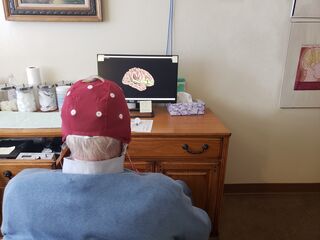Dementia
How Neurofeedback Can Help You
It may help with brain trauma, ADHD, long COVID, and dementia.
Posted March 26, 2022 Reviewed by Gary Drevitch

Neurofeedback is a computer-guided, noninvasive brain-function training based on EEG feedback. Neurofeedback is also called “neurotherapy,” “neurobiofeedback,” or “electroencephalography” (EEG) biofeedback, which helps control involuntary processes such as muscle tension and heart rate. Usually, the person is responding to a computer display of her/his own electrical activity of the brain, but it may also simply be a sound stimulation. The most important factor is that neurofeedback is focusing on helping a person train himself/herself to regulate brain functions.
What medical conditions can be helped with neurofeedback?
Neurofeedback is used to help treat a variety of neurological and mental health conditions such as concussions, stroke, migraines, anxiety, depression, sleep problems, chronic pain and PTSD. A review of the literature suggests that, so far, it’s most promising in helping treat ADHD in children by enhancing self-regulation, which improves attention and reduces impulsivity (Cortese, S. et al. 2016). It’s also helpful in enhancing mental sharpness in adults (Staufenbiel, S. M. et al. 2014). It is also promising in treatment of dementia. In the study by Berman, M.H. et al (2009) the subjects had “significant improvement in memory and some aspects of executive functioning” as compared to the control group. However, the researchers also concluded that neurofeedback is more effective for earlier stages of dementia.
The newest research studies suggest that it can be helpful in long-term COVID. The research studies on effects of COVID on the body and brain indicated that the virus is causing damage to the brain similar to traumatic brain injury (TBI). Therefore, what is helping patients with a history of brain trauma, may also be helpful in long-term COVID. The study by Luckos, M. et al. (2021) concluded that neurofeedback may be helpful in reducing neurocognitive dysfunctions in patients with long-term COVID.
For a variety of neurological and mental-health conditions, research results are inconclusive, but people who have tried it believe that it works. It is not a treatment program, but it is helpful in facilitating healing, provided that the person tries to live a healthy lifestyle and attends therapy. It may also help the person get better with fewer medications or hopefully without meds in the long run. However, it isn’t covered by most insurance plans, and you may need 10 or more sessions, so the financial burden may be significant. However, the good news is that neurofeedback is getting more popular because it is noninvasive and more therapists are using it, so some may offer a sliding scale or a package deal. Also, if neurofeedback is recommended by your medical provider, you may try to convince your insurance to pay for at least several sessions. Generally, if you can afford it, it’s worth a try, since any positive and goal-oriented brain stimulation exercises are good for your brain.
To find a neurofeedback practitioner, visit the Psychology Today Therapy Directory.
References
Cortese, Samuele, Maite Ferrin, Daniel Brandeis, Martin Holtmann, Pascal Aggensteiner, David Daley, and Paramala Santosh. “Neurofeedback for Attention-Deficit/Hyperactivity Disorder: Meta-Analysis of Clinical and Neuropsychological Outcomes From Randomized Controlled Trials.” (2016). Journal of the American Academy of Child and Adolescent Psychiatry. 55, no. 6 (June 2016): 444–455.
Staufenbiel, Sabine M., Anne-Marie Brouwer, A.W. Keizer, and Nelleke C. van Wouwe. “Effect of Beta and Gamma Neurofeedback on Memory and Intelligence in the Elderly.” Biological Psychology. 95 (January 2014): 74–85.
Berman,M.H, et al. ”Efficacy of neurofeedback for executive and memory function in dementia.” The Journal of the Alzheimer’s Association. July 2009, Volume 5.
Lucos, M.et al. “EEG Neurofeedback In The Treatment OF Cognitive Dysfunctions After The Infection Of SARS-CoV-2 and Long Covid-19. Acta Neuropsychologica; 19(3): 361-372,2021.


